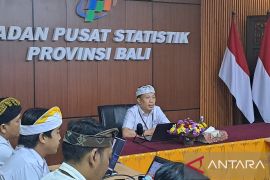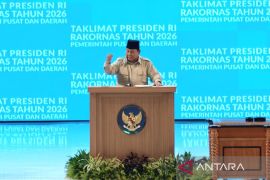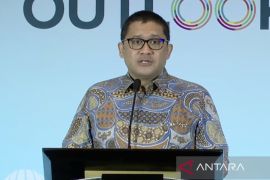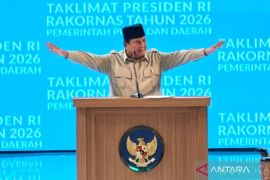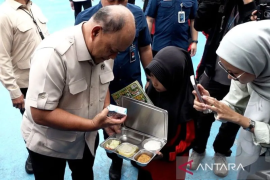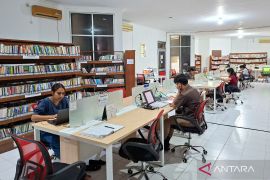The most high-profile initiative taken by Indonesia so far was Foreign Affairs Minister Marty Natalegawa`s announcement that his country intended to ratify the Comprehensive Nuclear Test Ban Treaty (CTBT). He did this at the opening of the 2010 Review Conference of the Parties to the Treaty on the Non-Proliferation of Nuclear Weapons (NPT) in New York on May 3, 2010.
"We hope that our decision to ratify the Comprehensive Nuclear-Test-Ban Treaty (CTBT) will be a positive incentive for other states to follow suit," Marty said during a press briefing on the second day of the NPT Review Conference at the UN Headquarters.
The initiative was praised by a number of leaders, including US President Barack Obama, UN Secretary General Ban Ki-moon and UN Special Envoy on CTBT Michael Douglas.
Tibor Toth, executive secretary of the Preparatory Commission for the Comprehensive Nuclear-Test-Ban Treaty Organization (CTBTO), said at the NPT conference 2010 that Indonesia`s announcement that it would soon ratify the Treaty "is extremely important for the entry into force of the CTBT."
CTBT bans all nuclear explosions in all environments, for military or civilian purposes. It was adopted by the United Nations General Assembly on 10 September 1996 but it has not entered into force.
Indonesia is one of the nine remaining "Annex 2" states whose ratification is needed for the CTBT to enter into force.
"Annex 2" States are states, whose signature and ratification are required for the Treaty to enter into force.
Marty`s announcement means CTBT needs only eight more ratifications - China, Egypt, the Democratic People`s Republic of Korea (DPRK), India, Iran, Israel, Pakistan and the United States - before it can enter into force.
Indonesia`s step is expected to generate a domino effect inspiring the eight countries which have not yet shown their intention to ratify the Treaty.
So far, of the total 195 states, 182 are signatories to the CTBT, which has been ratified by 153 countries. Indonesia signed the pact in 1996, the very day the Treaty opened for signature.
Minister Marty Natalegawa attended the NPT Review Conference 2010 in two capacities, namely as representative of the Indonesian government and on behalf of the 120-member NAM that are party to NPT.
Currently, Indonesia is the Coordinator of the NAM`s Working Group on Disarmament, and the chair of the Commission for Southeast Asia Nuclear Weapons-Free Zone (SEANWFZ) in 2011.
The SEANWFZ treaty was signed by all ASEAN members in 1995 and came into force in 1997. It expresses the region`s desire to contribute towards general and complete nuclear disarmament and the promotion of international peace and security.
Speaking before the House of Representatives (DPR) in December 2010, Minister Marty Natalegawa said it was now time for Indonesia to ratify the CTBT to raise the country`s influence as a supporter of nuclear disarmament.
"For Indonesia, the waiting time is over and the time to act has arrived. It is no longer appropriate for Indonesia to merely wait," he said when explaining the government`s plan to ratify the CTBT in the meeting with the Parliament.
He said now was the right momentum for disarmament and Indonesia should show its leadership by proactively ratifying the CTBT.
Marty believed this would strengthen Indonesia`s position and influence as a country that supports nuclear disarmament and give strong pressure on other countries to do the same.
The minister has submitted a bill on the ratification of CTBT to the DPR. The pending of CTBT ratification by Indonesia is just due to technical matters because the
Parliament has in fact also supported the ratification plan.
"Indonesia is very much committed to contributing to a world which is free of nuclear weapons," Muhammad Najib, head of the delegation of the House of Representatives (DPR)`s Commission I, said when visiting the Secretariat of the Preparatory Commission of CTBTO in Vienna, Austria, in May 2011.
Muhammad Najib, a PAN politician, was accompanied by Yahya Sacawiria (PD), Muchamad Ruslan (Golkar), Theodorus Yacob (PDI-P), and Syahfan Badri (PKS) in the meeting with CTBTO Executive Secretary Ambassador Tibor Toth.
DPR was looking for the right date to ratify CTBT and would also encourage other countries to ratify the treaty, the MP said.
In a seminar on "Measuring Progress towards a world free of nuclear weapons: the Indonesian perspective" organized by the Austrian Institute for International Affairs in Vienna on 12 May 2011, diplomats from Chile, France, Japan, Poland, Thailand and the United States expressed their support for Indonesia`s steps towards ratifying the CTBT.
"For the [Indonesian Parliament] it is not an issue of whether or
not to ratify this international treaty but more about when and
how to go about doing it in the best manner possible," Muhammad Najib said in the seminar.
CTBTO Executive Secretary Tibor Toth welcomed the statement and called on Indonesia to help invite several other NAM member countries, to also ratify the CTBT.
Indonesia`s commitment to CTBT has existed since the treaty was initiated and has even become a sponsor in the effort.
The late foreign minister Ali Alatas had played as a president of the conference on Partial Test Ban Treaty (PTBT) in 1991.
Indonesia`s intention to ratify the CTBT was also mentioned in "Berlin Statement" approved by foreign ministers of Australia, Canada, Chile, Germany, Japan, Mexico, the Netherlands, Poland, Turkey and the United Arab Emirates at a conference hosted by German Foreign Minister Guido Westerwelle on April 30, 2011.
"We are encouraged by the commitment expressed by the United States and by Indonesia to ensure ratification of the Treaty. We believe that an effective end to nuclear testing will enhance and not weaken our national as well as global security and would significantly bolster the global non-proliferation and disarmament regime," notes the Berlin Statement.
Indonesian President Susilo Bambang Yudhoyono in his opening speech at the Non-Aligned Movement Meeting in Bali in May 2011 expressed the country`s wish to see a future without nuclear weapons.
"We work very hard to advance a vision of a world of zero nuclear weapons," the president said. (*)
(T.F001/A/F001/S012) 07-06-2011 21:30:44
Reporter: Fardah
Editor: Fardah Assegaf
Copyright © ANTARA 2011
